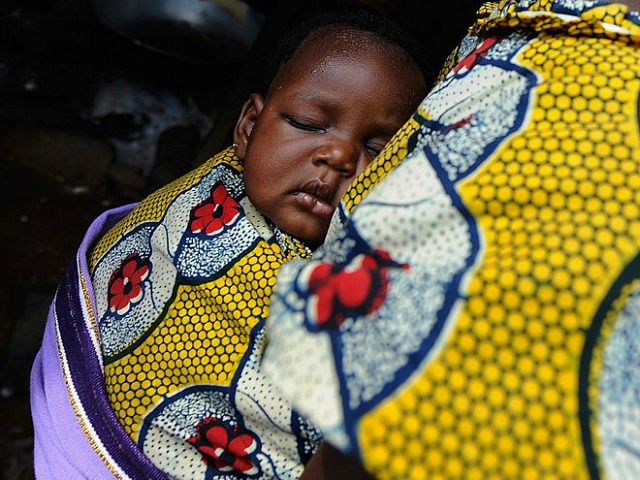Two women suicide bombers, believed to be tied to the Islamic State affiliate Boko Haram, reportedly committed a bombing in Nigeria while carrying infants on their backs.
Four people were killed by the terrorist attack in the northeastern town of Madagali, Adamawa State, last week, not including the two women and the two infants. They were two of four suicide bombers, police reported — two others detonated their bombs at a security checkpoint after being stopped. The women with the infants were not checked for bombs and detonated them around civilians in a market.
The use of child suicide bombers, particularly girls, has become a hallmark of Boko Haram. The jihadist group conducts mass abductions of women and girls, often selling them into sex slavery or “marrying” them off to jihadists and forcing them to convert to Islam.
The group rose to international prominence in 2014 after abducting hundreds of young girls from a secondary school in Chibok, Borno state, most of whom remain missing. The Nigerian military announced they had found an escaped Chibok girl and her child, born in captivity, earlier this month. The military has also successfully negotiated the release of a minority of the girls in the past two years.
The girls used in suicide bombings, most of which are not part of the Chibok group, have bombs strapped onto them and are sent into crowded markets, churches, or mosques. UNICEF announced in April 2016 that the use of underaged girls as suicide bombers had increased ten-fold in one year.
Before the bombing involving the infants, the most recent child suicide bomb attack in Nigeria had occurred a week ago in Maiduguri, the capital of Borno State. Boko Haram has established itself in Borno, where it was founded. Police identified the suicide bombers in last week’s attack as a 7-year-old and a 12-year-old.
The use of infants in suicide attacks, however, appears to be a new tactic. UNICEF told Reuters that the incident was the first of its kind they had recorded, though the Reuters report says only one infant died in the attack and two underaged girls; the BBC reported two infants killed. Reuters also reported that 17 people were killed in total. “We are extremely worried about the use of a baby in this callous way,” UNICEF spokeswoman Doune Porter told Reuters. It presents a new threat to the youngest among the victims of Boko Haram, few of whom have survived the insurgency in the past five years, according to aid groups.
Doctors Without Borders, which operates throughout northern Nigeria, told the New York Times this week that they have seen an alarming drop in the number of young children in refugee and internally displaced (IDP) communities. The group, the Times notes, “reported in November that it was seeing hardly any children under age 5 at its clinics, hospitals and feeding centers.”
“We saw only older brothers and sisters. No toddlers straddling their big sisters’ hips, no babies strapped to their mothers’ backs,” the Times quotes the organization’s statement as reading. In addition to jihadist persecution, many children face a variety of diseases due to living in areas that are now inaccessible to humanitarian groups due to Boko Haram. Many of the medical challenges facing them, like a resurgence of polio, are completely avoidable using modern medical technology.
Even those who have successfully fled Boko Haram face countless hardships. In the Rann IDP camp that houses many whose villages have been destroyed in Boko Haram raids, human rights groups say women and girls are forced or deceived into sexual relationships in order to feed themselves and their children. Adding to their indignity, the Nigerian military conducted an airstrike on the refugee camp last week, a move military officials described as a mistake.
“We saw dozens of patients with multiple traumatic injuries, including open fractures and wounds to the abdomen and chest,” one physician with Doctors Without Borders told Canada’s Globe and Mail of the airstrike. “I saw the bodies of children that had been cut in two,” lamented another.
The Nigerian newspaper Vanguard reports that local government officials claim over 250 people were killed in the airstrike, though official estimates put the number closer to one hundred.
Boko Haram has killed an estimated 15,000 people, according to Reuters. Nigerian President Muhammadu Buhari declared that he had “won the war” against the jihadist group in December 2015.

COMMENTS
Please let us know if you're having issues with commenting.